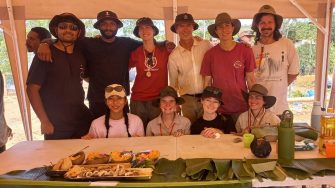
Representatives from the UNSW Global Water Institute and the Faculty of Engineering were delighted to accept an invitation from Permatil Executive Director Ego Lemos to participate in a valuable youth initiative that connected over 800 future sustainability leaders in Timor-Leste.
The National PermaYouth Camp 2024 began in Kaitarahei Village, Ermera, on 20 October, under the theme ‘Planting Water Brings Communities To Life’. Over five days, attendees learnt about permaculture techniques while participating in leadership training and cultural exchanges—becoming empowered in aspects of sustainable community development, water management, conservation and ecosystem restoration.
Organised by permaculture company Permatil, regular PermaYouth initiatives in Timor-Leste have successfully engaged over 5,500 young people through 14 regional and national camps. With funding from the UNSW Engineering Societal Impact and Translation Team, seven UNSW students also participated in the 2024 camp, joining peers from Dili Institute of Technology (DIT) and the National University of Timor-Leste (UNTL), along with other young people representing all districts and areas of society including young women, people with disability and people who identify as LGBTIQ+.
At the opening ceremony of the National Perma-Youth Camp 2024, President of Timor-Leste His Excellency José Ramos-Horta underscored the critical importance of water conservation and climate change mitigation, urging participants to take immediate action and calling for practical solutions at the grassroots level. Timor-Leste’s Program of the IX Constitutional Government prioritises resilience-building in regional communities, with food and nutrition security projects playing an important role.
The UNSW students who participated in Perma-Youth Camp 2024 were grateful for the opportunity to participate. They gained much from their experiences, not only taking home technical permaculture skills and knowledge but also returning with new friends, cultural awareness and first-hand insights into some of the unique water and environment challenges experienced by Timor-Leste communities.
During the visit to Timor-Leste, Professor Leslie was joined by School of Civil and Environmental Engineering Associate Lecturer Dr Philippa Higgins and Water Research Laboratory Principal Engineer Alice Harrison on visits to DIT and UNTL, where joint projects were discussed and progressed. Dr Higgins presented on her work using satellite data to model water security in Timor-Leste while Alice Harrison provided an overview of her work on hydrological monitoring and water balance modelling.
The visit to Timor-Leste comes shortly after a delegation led by President Ramos-Horta visited UNSW in early October. The delegation met with senior leadership and participated in a range of forums and discussions, including a session chaired by UNSW Dean of Engineering Professor Julien Epps on the topic of Water, Food and Health in Timor-Leste.

Student insights
Paul Ananth, Civil Engineering & Commerce: “Our trip to Timor-Leste has been a unique and enriching experience. From exploring Dili, to the mountains of Ermera, I have been immersed in such diverse culture that has truly been eye opening. In particular, our participation in the Perma-Youth Camp has allowed us to embrace local knowledge and customs. This in turn has enabled us to appreciate the importance of groundwater and natural terrain management in rural areas of mountainous Timor.”
Kelsey O’Grady, Mechanical Engineering: “This trip has been incredibly grounding and has provided me with a new perspective of how lives can be lived and how engineering practice can be utilised to improve the world. Learning the sustainable practices of permaculture amongst the kindest and most earnest people is purely inspiring. Being able to physically apply the existing water management practices of Timor-Leste is a learning experience that can be found nowhere else. The diving, the lovely Timorese people and the outdoors set this trip apart from other opportunities.”
Zoe Walton, Renewable Energy Engineering: “My time in Timor-Leste was truly amazing; the people and the country itself were so welcoming and enthusiastic. I learned so much about permaculture alongside water conservation in an environment where it is clear to see how big of an impact education has on remote communities.”
Jess Norman, Environmental Engineering: “I was able to immerse myself into the Timor culture with a great group of people while educating myself on the methods and importance of water and land management in rural communities."
Neel Ketkar, Electrical Engineering: “I was able to gain knowledge on water conservation practices used in the communities while experiencing the Timor-Leste lifestyle.”
Amelia Vasiliou, Mechnical Engineering: “This lovely country with its kind and welcoming people has made this an unforgettable experience. I’ve felt that I’ve really been able to engage with the camp and its activities, from seminars to digging terraces and swinging pickaxes into the ground, and even a fun and chaotic camp wide cooking competition. Never been a dull moment and the locals have been incredibly helpful and made us feel included as well as taught us some new dance moves. I’ve gotten to see an engineering degree in action whilst making some lifelong memories.”
Emily Mainhi, Mechanical Engineering: “This trip was an invaluable experience filled with such a different culture, way of living and the most welcoming people. The Permayouth camp has enriched me with knowledge of land, conservation, the importance of looking after people and communities, and wonderful friendships. I am so grateful to have been able to participate in this program and will carry the things I have learned with me.”
